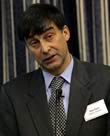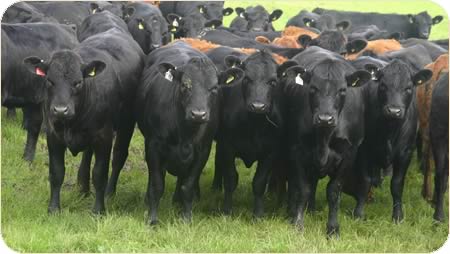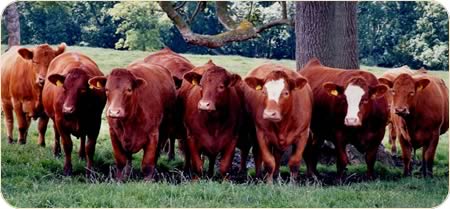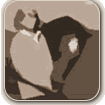Jennifer MacKenzie is an agricultural photo journalist with almost 30 year's experience. Operating from her base in Cumbria, Jennifer undertakes mainly industry-related freelance writing and photography.
Beef Improvement Group conference
Almost 300 delegates, including farmers and other representatives of the beef industry, attended a one-day conference at Askham Bryan College, near York, on Thursday (Jan 27) looking at beef production under the new Single Farm Payment Scheme. The conference was organised by the Beef Improvement Group (BIG) which is developing its Stabiliser programme in the UK. Speakers addressed supplying the consumer with consistent high quality beef and the role the Stabiliser can play in helping producers have a competitive edge. The sessions were chaired by Sir Don Curry and Lord Haskins.
 |
The new composite beef breed the Stabiliser has so far been successful for the Lilburn Estates Farming Partnership near Wooler.
But Ray Field, farm manager of the large in-hand operation for Duncan Davidson in North Northumberland, warned that CAP reforms - the suckler cow without its subsidy and potential inconsistencies in applying cross compliance - could threaten the sustainability of the suckler industry.
Lilburn Estates initially began to use Stabiliser semen on its suckler herd in 2000 and Mr Field outlined the beef enterprise to the conference.
The conference attended by almost 300 delegates, including farmers and other representatives of the beef industry, heard speakers talk about supplying the consumer with consistent high quality beef and the role the Stabiliser can play in helping producers have a competitive edge.
Mr Field, who also summarised the topics covered by the speakers at the end of the conference, explained the introduction of the Stabiliser to the estate’s in-hand farming operation which has 5,450 acres of combinable crop, 5,285 acres of lowland grass, 155 acres of forage crops, 14,600 acres of hill and heather grouse moor and 2,300 acres of woodland.
As well as a breeding and finishing sheep enterprise totalling 28,380 head, the unit’s 3,068 cattle includes 1,134 suckler cows, 1,536 finishing cattle, 370 Stabiliser bred replacements, six continental stock bulls and 18 Stabiliser stock bulls.
Mr Field explained that the Stabiliser breeding programme was established in 2000 with BIG, the initial programme starting with AI on 90 Holstein cross Limousin heifers.
A 300 cow herd is now established grading up to pure with 200 F1 cows and heifers plus 70 F2 heifers.
Also 60 pure Stabiliser females have been produced from an embryo transfer programme.
The entire herd is screened for Leptospirosis, BVD and Johne’s disease and all breeding yearling bulls are semen tested.
Mr Field said: “In our beef finishing enterprise, males are currently kept entire and are finished on grain beet diet.
“We have found Stabiliser bulls give an equal to or better performance than continental bulls with an average carcase weight of 320kg at 12-14 months.”
All cattle, including continental cross heifers finished on grass and silage at 18-24 months, are sold deadweight.
“At Lilburn the change to Stabiliser has led to a home-bred replacement policy which in turn improves herd bio-security and health status, it reduces replacement costs by half,” he added.
“It also means that we have control of genetics and we can ensure uniform animal populations.”
 |
| Home-bred 10 month old F1 Stabiliser heifers to be mated to Stabiliser bulls to calve at two years old at Robert Robinson's Snipe House, Alnwick. |
Management benefits at Lilburn with the introduction of Stabilisers have been a low birth weight and improved fertility.
They are docile to handle with low maintenance costs and Mr Field said they make more efficient use of grass, particularly the calving heifers which only receive 15 to 20lb a head of concentrate before calving at two years old.
“My concern post CAP reform is whether beef production is sustainable. We can try to cut down costs but obtaining a fair price for beef is very important. I sell to who pays the most money after off-takes but that’s more difficult to work to. Then industry needs common standards,” said Mr Field.
He also said he had great concerns about the consistency of how cross-compliance was applied across the country which may affect the competitiveness of farms which out-winter cattle such as at Lilburn.
*********
The BIG initiative was established by JSR Farms’ Richard Fuller and three fellow Yorkshire based beef producers as a business structure designed to accelerate the multiplication and marketing of Stabiliser genetics, a composite of two British and two continental beef breeds.
Since the first Stabiliser embryos were imported by BIG from the USA in 1998, the venture has extended to involve more than 13,000 commercial suckler cows in herds throughout the UK.
 |
| Stabiliser cattle at JSR Farms, Givendale |

